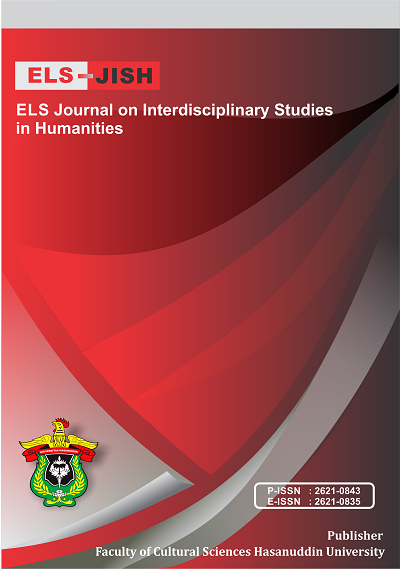Utilizing Local Wisdom-Based Reading Text to Improve Students’ Reading Comprehension of the Second Grade of MAN 1 Baubau
DOI:
https://doi.org/10.34050/elsjish.v4i1.13351Keywords:
Local wisdom reading text, students’ schemata, reading comprehension, students’ perceptionAbstract
Local wisdom-based reading text as the authentic teaching material overcomes various obstacles of reading comprehension in EFL which activate the students’ schemata. This research is about utilization of the local wisdom-based reading text to improve students’ reading comprehension. The types of comprehension include identifying main idea, understanding unfamiliar words, identifying text details, and being able to find reference within the text, being able to make inference regarding the text. The research design was pre-experimental study using a sample of 27 students in the second grade of Madrasah Aliyah Negeri 1 Baubau. A pre-test was administrated before intervention and after the same test for the post-test was administered to find out the students’ improvement on reading comprehension. The result confirmed that local wisdom-based reading text is an effective tools to empower EFL learners’ comprehension. The most prevalent improvement regards familiarity of the lexical items ability in making inference as well as finding out main idea. The students’ positive responses that were based on the perception confirmed that local wisdom-based reading text could be encouraged to come up with pedagogical implication applicable for the EFL classroom notably at the second grade of MAN 1 Baubau.
References
Al-Salmi, M. 2011. Schemata (Background Knowledge and Reading Comprehension for EFLStudents. Research Journal Specific Education. Faculty of Specific Education. Mansoura University. Issue No. 22, Jul. 2011.
Carlisle, J. F., & Rice, M. S. 2002. Improving Reading Comprehension Research-Based Principles and Prectices. Timonium, MD: York Press, Inc
Gay, R., Mills, Geoffrey. E. & Airasian, Peter. (2012) Educational Research: competencies for analysis and applications. New Jersey: Pearson Education, Inc
Goodman, K. 1967. Reading: A Psycholinguistic Guessing Game. Journal of the Reading Specialist.
Grobe, W & Stoller, F. 2002. Teaching and Researching Reading. Harlow: Pearson Education.
Mansyur, F. A., & Suherman, L. A. (2020). The Function of Proverbs as Educational Media: Anthropological Linguistics on Wolio Proverbs. ELS Journal on Interdisciplinary Studies in Humanities, 3(2), 271–286. https://doi.org/10.34050/els-jish.v3i2.10505
Mickulecky, B. S., & Jeffries, L. 1996. More reading power. New York: AddisonWesley Longman.
Nunan. 1991. Language Teaching Methodology A Textbook for Teacher. Prentice Hall, International Language Teaching.
Nuttal, C. 1982. Teaching Reading Skill in a Foreign Language (New Edition). Heinemann Educational Book: Oxford University Press.Pang, E. S., Muaka, A., Bernhardt, E. B. & Kamil, M. L. 2003. Teaching reading. Geneva: IBE, Publications Unit
Saputro, E., Widodo, M., & Rusminto, N. 2014. Pengembangan Bahan Ajar Menulis Berbasis Nilai-Nilai Kearifan Lokal. Jurnal J-Simbol (Bahasa, Sastra, dan Pembelajarannya), 1-15.
Sugiyono.2008.Metode Penelitian Statistik. Bandung: Pustaka Karya.
Rahman, F., & Amir, P. (2019). Trends in Reading Literary Fiction in Print and Cyber Media by Undergraduate Students of Hasanuddin University. International Journal of Education and Practice, 7(2), 66–77.
Rahman, F., & Weda, S. (2018). Students’ perceptions in appreciating English literary works through critical comment: A case study at Hasanuddin University and Universitas Negeri Makassar. Asian EFL Journal, 20(3), 149–172.
Rahman, Fathu. (2017). Cyber Literature: A Reader Writer Interactivity. International Journal of Social Sciences & Educational Studies, 3(4), 156–164. https://doi.org/https://doi.org/10.23918/ijsses. v3i4p156
Rahman, Fathu. (2018). The Constraints of Foreign Learners in Reading English Literary Works: A Case Study at Hasanuddin University. Journal of Arts and Humanities, 7(2), 01. https://doi.org/10.18533/journal.v7i2.1327
Yousef, Hedieh, et all. 2014. The Relationship between Cultural Background and Reading Comprehension. Iran: Islamic Azad University. Theory and Practice in Language Studies. Vol. 4 No. 4. 707-714.
Downloads
Published
How to Cite
Issue
Section
License
Copyright (c) 2021 Fikratul Khairiyah, Abidin Pammu, Sukmawaty Sukmawaty

This work is licensed under a Creative Commons Attribution-NonCommercial-ShareAlike 4.0 International License.






